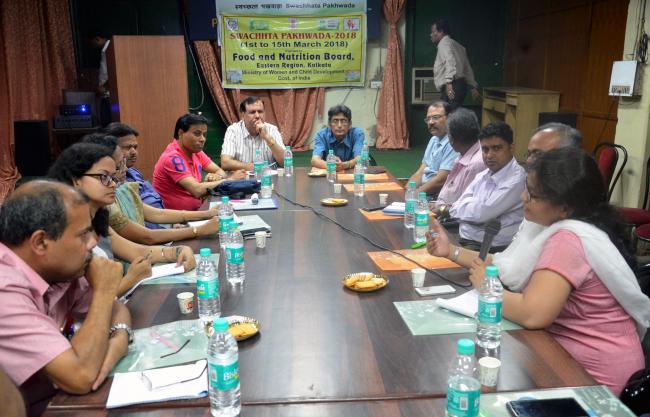
Cleanliness fortnight observed by Food and Nutrition Board
Kolkata, Mar 7 (IBNS): A meeting to orient and design plan of action for hygiene, environmental sanitation and nutrition was organised by Food and Nutrition Board, Ministry of Women and Child Development here on Wednesday.
Participants included officials from Central and State Government Departments working at field level to generate awareness and behavioural changes in the sphere of cleanliness and hygiene as well as NGOs and publicity units also working for this cause.
In his opening remarks, N.N. Tewari, Deputy Technical Adviser of Food & Nutrition Board, threw light on the relation between poor hygiene and nutritional deficiencies that leads to diseases.
Poor sanitation causes loss of GDP because of reduced man-days at work, he stated.
Building on the commonly agreed view that behavioural change in respect of open defaecation is still needed, Pijush Adhikari from Panchayat and Rural Development Department, Government of West Bengal narrated as to how inter-personal and group communication at village and block level has gone a long way towards achievement of Open-Defecation Free status in many villages throughout West Bengal.
Inspite of having household toilets, some people still prefer going for defecation in the fields, informed Adhikary.
Stating specific examples, he mentioned that candid conversations and grassroots level communication with men, women, children, village elders, anganwadi workers, panchayats and other stakeholders has led to considerable improvement in the situation.
I & B Ministry’s Song and Drama Division and Department of Field Publicity works along with them to carry out this onerous task.
Speaking about behavioural change, Chinmay Chakraborty, Joint Director of PIB opined that right from childhood, one has to be made aware about hygienic practices.
In support of this view, Dipak Mitra, Deputy Director in Ministry of Home Affairs also added, children can be trained to become agents of change since a message carried by them to the grown-ups will strike more effectively.
Parthasarathi Basu from West Bengal Government’s Women and Child Development and Social Welfare Department informed, children, growing girls and mothers in anganwadi centres are taught about personal hygiene and menstrual hygiene.
Handwashing Day and Week are observed in anganwadis to teach them about right way and necessity of hand-washing.
Swachhata is a mandatory topic for discussion in kishori and mother’s meetings at these centres, Basu informed.
A representative from the NGO named ‘Save the Children’ stated as to how they are using games and ICT modules to educate children about hand-washing and other hygienic practices in schools.
Food & Nutrition Board is observing Swachhata Pakhwada from 1st to 15th March through various awareness programmes on hygiene, environmental sanitation and nutrition.
Support Our Journalism
We cannot do without you.. your contribution supports unbiased journalism
IBNS is not driven by any ism- not wokeism, not racism, not skewed secularism, not hyper right-wing or left liberal ideals, nor by any hardline religious beliefs or hyper nationalism. We want to serve you good old objective news, as they are. We do not judge or preach. We let people decide for themselves. We only try to present factual and well-sourced news.







